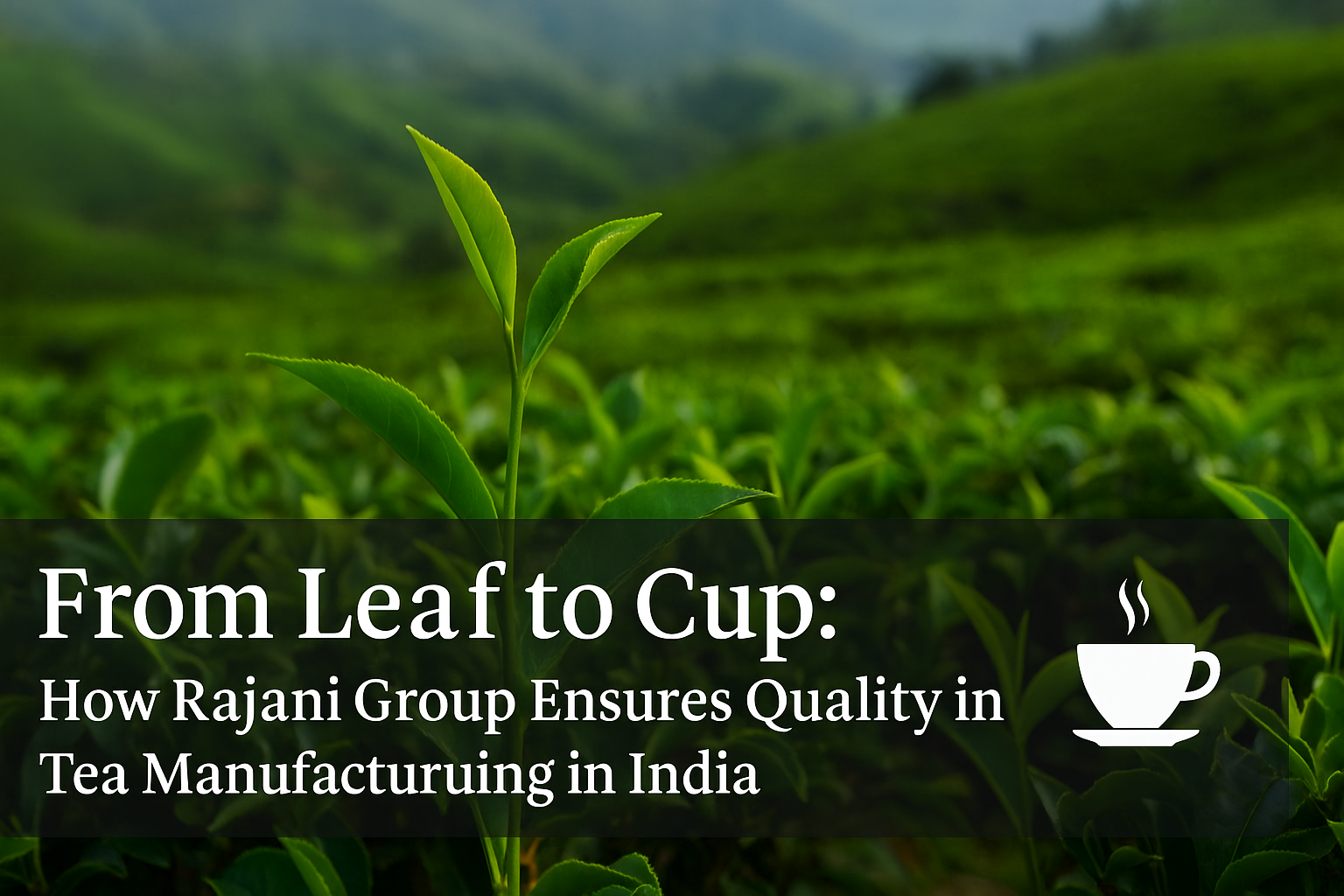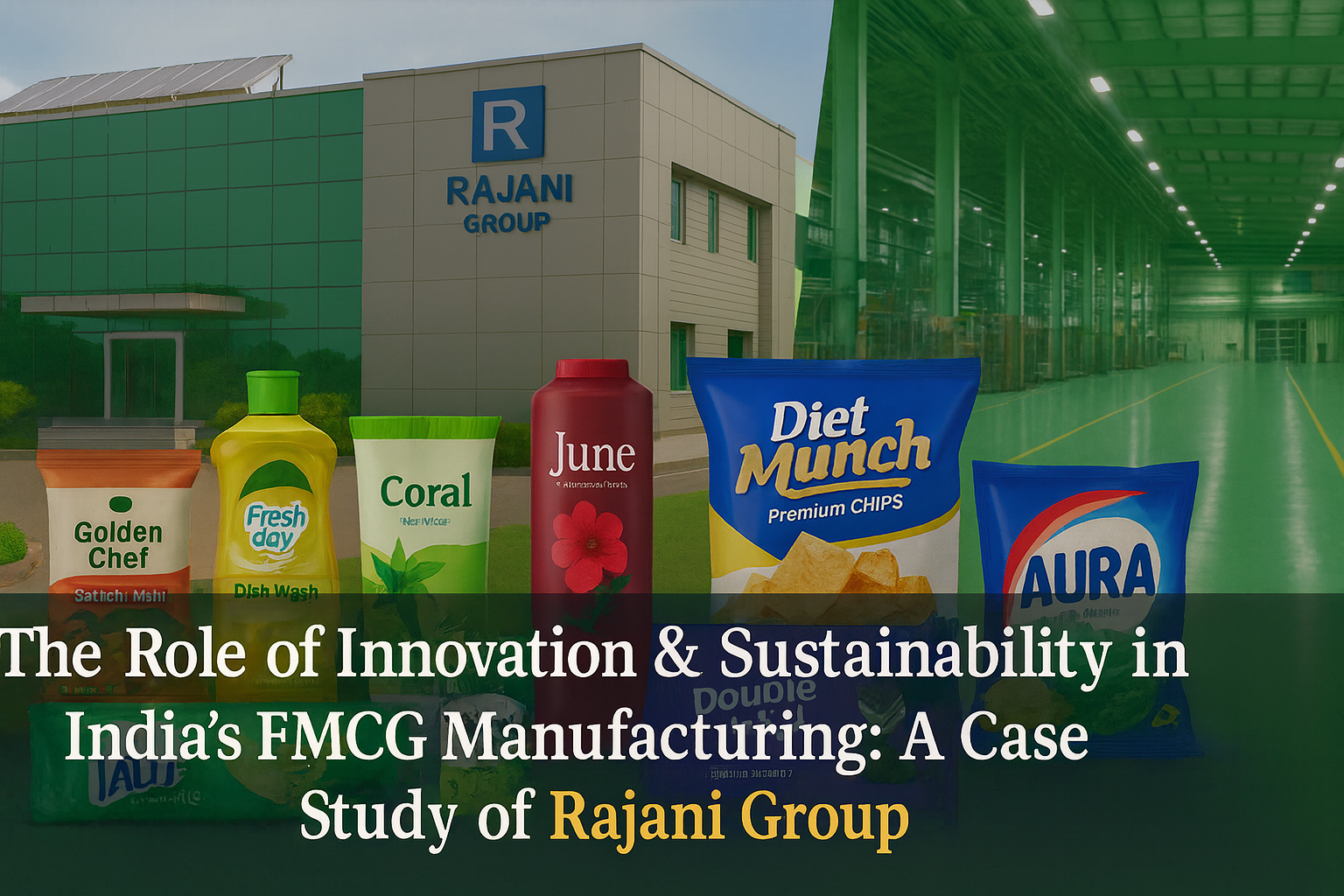From Leaf to Cup: How Rajani Group Ensures Quality in Tea Manufacturing in India

Tea is more than just a drink in India — it’s culture, comfort, tradition. For a manufacturer in India’s vibrant FMCG (fast-moving consumer goods) sector, ensuring that each cup delights is a serious commitment.
In this blog, we’ll explore how Rajani Group navigates the entire journey of tea — “from leaf to cup” — and what goes into maintaining quality through the manufacturing process of tea in India.
1. The Origins: Sourcing the Leaf
The journey begins at the very source: high-quality tea leaves. For a brand like Rajani Group of Companies, underpinning the promise of flavour and consistency means being selective about where and how tea leaves are sourced. Founded in Gujarat in 1975, Rajani Group started in the tea business and has grown into a recognised FMCG manufacturer in India.
By sourcing from trusted gardens and regions, the company ensures raw material standards. While the website does not list every garden, the “extra premium” tea variants suggest sourcing from premium estates and using certified leaves. For example, they reference “select ‘Trustea Certified’ gardens of upper Assam & Darjeeling” for their flagship tea line.
In India’s tea manufacturing landscape, sourcing is critical because leaf quality affects everything downstream: processing, flavour, aroma, brewing behavior. By emphasising the leaf, Rajani Group aligns itself with the best practices of tea manufacturing in India: transparent sourcing, appropriate estate selection, and a clear supply chain.
2. Processing and Blending: From Leaf to Tea Grade
Once the leaves arrive, the processing stage begins. Processing defines how the leaf is treated (withering, rolling, oxidation, drying) and determines the tea grade (leaf, broken leaf, fannings, CTC [crush-tear-curl]) used for different products. The journey of “from leaf to cup” depends heavily on how well this stage is executed.
The Rajani Group offers a variety of tea grades under the “Tea” category on their website: for example, you’ll find “Extra Premium Leaf Tea”, “Premium Broken Tea”, “Premium Fanning Tea”, and “Premium Masala Tea”.
- Leaf teas (whole or large-leaf) demand gentle handling, controlled oxidation, and high-end blending to capture subtle flavours.
- Broken, fannings, and CTC grades are more robust, suited to strong milk-tea (cha-patti) markets.
Rajani’s multiple grades suggest a processing line equipped to deliver both premium and mainstream offerings. The blend within each product ensures consistency in taste, aroma, and brewing performance. Because Indian consumers often brew tea with milk and sugar, ensuring that the final blend holds up in that context is key.
3. Quality Assurance & Certifications
In the FMCG sector in India, particularly for tea manufacturing, quality is non-negotiable. Standards span microbiological safety, pesticide residues, packaging integrity, shelf-life, and consumer sensory experience. The Rajani Group website emphasises their commitment to “unwavering quality standards across all products” under their mission statement.
While the website does not detail every certification, the mention of “Trustea Certified” gardens implies that they engage with recognized certification ecosystems for tea in India — this helps ensure ethical sourcing, sustainable practices, and traceability.
Quality assurance in tea manufacturing also means:
- Monitoring of leaf moisture, oxidation levels, and drying parameters.
- Checking for adulteration (a risk in commodity markets).
- Maintaining hygiene in processing, packaging, and storage.
- Ensuring packaging protects aroma and flavour and prevents ingress of moisture/odour.
By integrating these controls, Rajani Group positions itself well within the theme of “tea manufacturing in India” as a serious, trusted brand.
4. Packaging & distribution: Ensuring Freshness to the Cup
Even the best tea processing is wasted if packaging or distribution fails. Packaging for tea must preserve its aroma, prevent exposure to moisture/air, and maintain its integrity during transit. While the Rajani website showcases the product category “Tea” (see the page for their tea line), they also emphasize “Millions of Happy Customers” and wide distribution through 450+ distributors and 700+ SKUs.
Distribution is critical in India: vast geography, varying climatic conditions, long shelf-life demands in remote markets, and many touchpoints (wholesalers, retailers, rural distribution). Rajani’s long track record (founded in 1975) and large distributor network indicate they have built infrastructure to deliver consistent product quality at scale.
5. Consumer Experience: The Cup of Trust
At the end of the chain is the moment of truth: when a consumer brews a cup of tea, whether they feel the flavour, aroma, freshness, strength, and consistency they expect. For the Rajani Group, the brand promise is about “Lifetime Bonding” (their tagline), emphasising enduring trust and repeat quality.
From an Indian tea manufacturing perspective:
- The blend must perform well with typical preparation methods (milk + sugar) common in India.
- Packaging and branding must communicate trust, consistency, and value.
- Feedback loops from consumers & retailers help in continuous improvement.
Rajani’s evolution—from humble beginnings in 1975 in Gujarat to a recognised FMCG name in India—illustrates how a manufacturer can scale quality and trust.
6. Innovation & Growth: Sustaining Quality in Scale
Growing from one small tea business into an FMCG manufacturer with many household essentials required the Rajani Group to constantly adapt. Their story shows:
- Expansion into new units (e.g., a blending & packing unit shift to Junagadh) to improve processing and logistics.
- Launching new brands (e.g., “Rajani Extra Premium Tea” in 2017) sourced from selected gardens.
- Maintaining a wide product portfolio and leveraging manufacturing capabilities across categories implies strong infrastructure and process maturity.
For tea manufacturing in India, this is important: as consumer tastes evolve, as competition increases, maintaining quality across volumes, grades, and channels becomes challenging. Companies like Rajani Group show that sustained investment in sourcing, processing, quality systems, packaging, and distribution enables meeting these demands.
7. Why This Matters: Tea Manufacturing in India & Rajani Group’s Role
India is one of the world’s largest tea producers and consumers. The process of tea manufacturing in India spans vast regions, multiple grades, and both mass and premium markets. Quality differentiates in a crowded marketplace. By focusing on leaf quality, processing, quality assurance, packaging, and consumer trust, Rajani Group demonstrates how a manufacturer can succeed in this sector.
Their website gives a snapshot of their journey and their tea category, Premium Tea, where one can see the variety of tea products they offer.
By emphasising the end-to-end journey — “from leaf to cup” — they address the entire value chain: sourcing, processing, blending, packaging, distribution, and finally delivering the promise of a satisfying cup of tea for the consumer. For any company operating in tea manufacturing in India, such end-to-end quality control is what differentiates brands and builds long-term loyalty.
Conclusion
In summary, when you pour a cup of tea from a trusted brand like Rajani Group, understand that behind that simplicity lies a complex, carefully managed manufacturing process:
- Sourcing premium leaves from reliable estates.
- Processing and blending to produce consistent grades.
- Implementing quality assurance systems.
- Packaging to preserve aroma and taste.
- Distributing across India to reach millions of households.
- Maintaining the brand promise of trust, value, and repeat performance.
For anyone interested in tea manufacturing in India, the story of Rajani Group offers practical insight into what it takes to build and maintain quality at scale. As consumers, appreciating that journey adds value to every sip.
Frequently Asked Questions (FAQs)
1. What makes Rajani Group a trusted name in tea manufacturing in India?
Rajani Group has been a leading FMCG manufacturer since 1975, known for its consistent quality, ethical sourcing, and premium tea blends. The company ensures that every batch of tea—from leaf selection to packaging—meets strict quality standards for flavour, freshness, and aroma.
2. Where does Rajani Group source its tea leaves from?
Rajani Group sources its tea leaves from reputed and certified tea gardens, including select “Trustea Certified” estates in Assam and Darjeeling. This ensures superior raw material quality and supports sustainable, ethical sourcing practices.
3. What types of tea does Rajani Group offer?
The company offers a wide range of teas, including Extra Premium Leaf Tea, Premium Broken Tea, Premium Fanning Tea, and Masala Tea. You can explore all varieties on their official website at Rajani Group Tea Collection.
4. How does Rajani Group maintain the freshness and aroma of its tea?
Rajani Group uses advanced blending, hygienic processing, and airtight packaging to preserve the natural aroma and taste of its tea. Their strong distribution network further ensures that the product reaches customers fresh and full of flavour.
5. What is Rajani Group’s approach to sustainability in tea production?
Sustainability is integral to Rajani Group’s operations. By sourcing from certified gardens, minimizing waste, and focusing on eco-friendly packaging, the company supports responsible manufacturing practices within the Indian FMCG industry.





